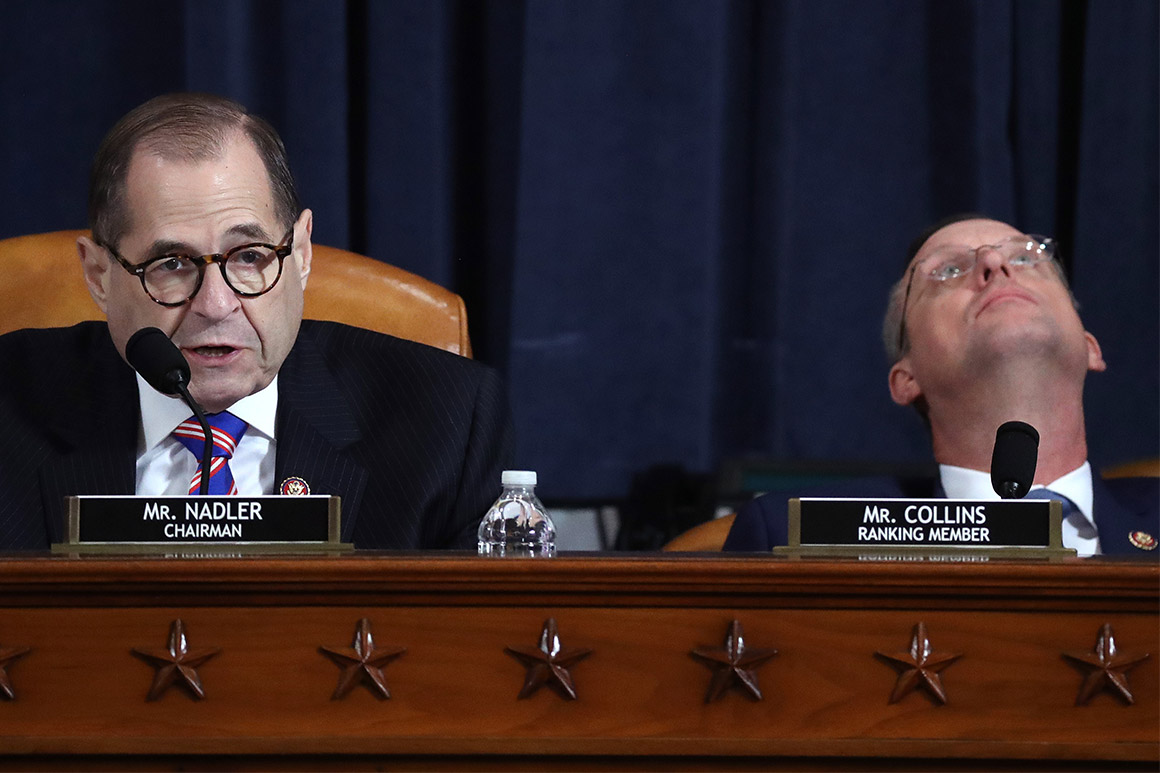
1. Speed
Why the rush? Democrats, now in the midst of House Judiciary Committee hearings, seem intent on forcing an impeachment vote before Christmas. But moving too fast risks ignoring new evidence that might emerge, failing to pressure key players to testify and/or turn over records, letting the story’s momentum die over the holidays and playing into Trump’s hands.
In its several hundred-page report, the House Intelligence Committee makes a strong case for moving expeditiously, noting that given the “threat of further presidential attempts to solicit foreign interference in our next election, we cannot wait to make a referral until our efforts to obtain additional testimony and documents wind their way through the courts.”
But despite the overwhelming evidence in the report, the current sprint looks more like panic than confidence. Some Democrats worry that the hearings so far have failed to move public opinion and seem anxious to put it behind them.
In their haste, House Democrats have not pursued the enforcement of subpoenas against the administration figures who have acquiesced to Trump’s efforts to obstruct the probe. The list of spurned subpoenas includes acting White House chief of staff Mick Mulvaney; his aide Robert Blair; National Security Council lawyer John Eisenberg; Michael Ellis, Eisenberg’s deputy; State Department counselor T. Ulrich Brechbuhl; Brian McCormack, former chief of staff to Energy Secretary Rick Perry; as well as officials from the Office of Management and Budget. Nor have they tried to enforce subpoenas for crucial documents against other officials or even attempted to get testimony from Perry, Secretary of State Mike Pompeo or Defense Secretary Mark Esper.
And they have not subpoenaed former national security adviser John Bolton, who has made it abundantly clear that he knows a lot about the whole Ukraine deal. Here, Democrats may actually hold stronger cards than they think. The ruling by a federal judge rejecting the Administration’s claim that former White House counsel Don McGahn had “absolute immunity” suggests that the House might win those subpoena fights in the courts. So why not let the cases play out a bit longer?
But, perhaps most important, the rush to a vote ignores the fact that speed is Donald Trump’s friend.
Trump counts on a dizzying, vertiginous cycle of news, outrage and disinformation to move past damaging stories before they are fully absorbed or placed into context.
Blink and you will miss it: kids in cages, “human scum,” the G-7 and Doral, “send her back,” his fraudulent foundation. Remember when Trump was planning to invite the Taliban to Camp David on the eve of 9/11? And how many weeks has it been since he gave Turkish President Recep Tayyip Erdoğan the green light to invade Syria?
Stories that would once have dominated the public’s consciousness for weeks, now can vanish in less than a single news cycle. By Friday of every week, even those of us who follow the news for a living have a hard time remembering the stories that had consumed our attention on Monday.
The same speed warp applies to impeachment. When did Ambassador Bill Taylor testify? Two months ago? Can you remember the key takeaways from his testimony? Who did Rudy Giuliani call when he was trying to have Ambassador Marie Yovanovitch sacked? What exactly is his relationship with indicted businessman Lev Parnas? Who tried to get the former Ukrainian prosecutor fired, and why?
Trump thrives on this pace, knowing that he can move the focus from one issue to another and eclipse the most embarrassing stories with yet another embarrassment via tweet. For Trump, a dozen scandals are easier to face than one or two and the flood of new provocations serves not to outrage, but to distract and exhaust.
At this pace, a quick vote in December and a Senate acquittal in January will likely be forgotten by May. That’s the world we live in.
So there is value in slowing down and letting key pieces of evidence sink in for the public. Let the public catch up. Let the stories marinate a while. Tell them over and over again. Pause and focus on the key elements. Repetition, amplification and context are your friends.
And it is also possible that new and damning facts will emerge in the meantime through reporting. They don’t help as much if they arrive after the Senate vote is taken.
Which brings us to the second threat:
2. Squirrels
Don’t get distracted by trivia, circuses and SQUIRRELS!
Trump is the master of distraction and the media nearly always takes the bait. But Democrats need to keep the focus on the main event: abuse of power and obstruction.
Everything else is a sideshow. And there will be many: the histrionics, tweets, polls, conspiracy theories. Even stories about former FBI lawyer Lisa Page.
GOP members on the Judiciary Committee have already signaled they will attempt to beclown the process, but pressure to chase squirrels will also come from Trump critics on the left. There is a real danger here because there are so many legitimate potential sideshows: the emoluments clause, Trump’s taxes, his treatment of women, his chronic lying and racism. Inevitably there will be pressure: Why not pursue those, too?
All squirrels. And the squirrels almost always get away.
3. Guano
Impeachment, of course, is a solemn constitutional process that should center on facts, evidence and truth. Instead, we are getting a blizzard of bat shit.
“Much of the Republican Party,” the Washington Post reports, “is pressing ahead with debunked claims about Ukraine as they defend President Trump from possible impeachment, embracing Russian-fueled conspiracy theories that seek to cast blame on Kyiv rather than Moscow for interference in the 2016 U.S. election.”
In other words, the GOP and its media allies are adopting what former White House official Fiona Hill described as “a fictional narrative that has been perpetrated and propagated by the Russian security services.”
This willingness to embrace bat-guano crazy conspiracy theories will test the sanity of Democrats and voters alike. Unfortunately, the chief purveyor of the looniest theories is not Louisiana Senator John Kennedy (who was for it before he was against it before he was for it again) or even Representative Devin Nunes—it is the president of the United States himself, who continues to peddle bizarre stories about Ukraine, a tech company called CrowdStrike and the hacking of the DNC.
“It’s not only a conspiracy theory,” Trump’s former homeland security adviser, Tom Bossert, complained in September, “it is completely debunked.”
“It sticks in his mind when he hears it over and over again, and for clarity let me just repeat that it has no validity,” Bossert said.
It is important to recognize that the point of this Trumpian exercise in fabulism and gaslighting is not to convince the public of Trump’s innocence, but to confuse and obfuscate and hopefully make the public tune out and turn away.
Hannah Arendt, the philosopher and political theorist, explained the process and the consequence:
“The result of a consistent and total substitution of lies for factual truth is not that the lie will now be accepted as truth, and truth be defamed as lie,” she wrote, “but that the sense by which we take our bearings in the real world—and the category of truth versus falsehood is among the mental means to this end—is being destroyed.”
And if that is not a real and present danger to the Republic, what is?
Source: politico.com
See more here: news365.stream





